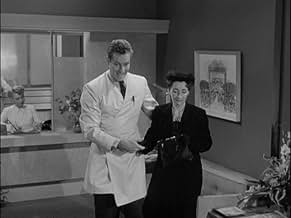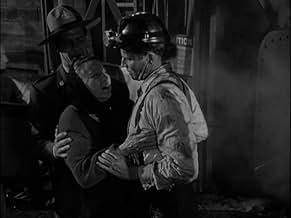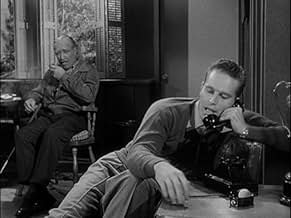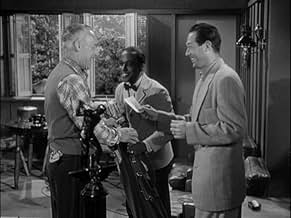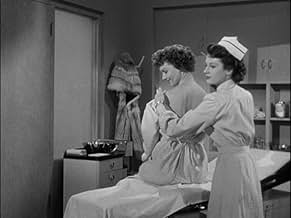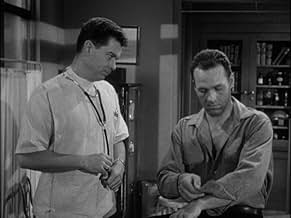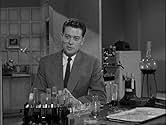CALIFICACIÓN DE IMDb
5.8/10
1.1 k
TU CALIFICACIÓN
Un médico que regresa de la Guerra de Corea a su ciudad natal en Pensilvania debe decidir qué hacer con su vida.Un médico que regresa de la Guerra de Corea a su ciudad natal en Pensilvania debe decidir qué hacer con su vida.Un médico que regresa de la Guerra de Corea a su ciudad natal en Pensilvania debe decidir qué hacer con su vida.
- Dirección
- Guionistas
- Elenco
Philip Ahlm
- Minor Role
- (sin créditos)
Elsie Baker
- Mrs. Olzoneski
- (sin créditos)
Mary Benoit
- Party Guest
- (sin créditos)
Opiniones destacadas
Charlton Heston ("Col. Owen") returns from almost ten years as an army surgeon to his Pennsylvania home to find that his dead brother has been accused of sloppy practices that caused fatalities at a coal mine. His mother (Mildred Dunnock) and local doctor "Scobee" (Rhys Williams) hope he will stay and help the local community, but he discovers that his late brother had run up quite a bit of debt and determines to pay it back. A chance meeting with the "Helen" (Lizabeth Scott) - the daughter of the man who holds the debt - introduces him to new opportunities. She is wealthy, twice divorced, and well connected. His quick thinking after an incident at a party sees an association with prominent, and rather venal, doctor "Gleeson" (Lester Matthews) offer him a route to success and prosperity. Along the way, he proposes to "Helen" and all looks set fair. Much of this film takes a swipe at the hypochondriac patients - mostly wealthy women - and at the physicians who are little better than charlatans; charging a small fortune for glorified Alka Seltzer. Will "Owen" continue to be satisfied with this increasingly unfulfilling existence or will his innate instincts developed during wartime send him back to tend to the more legitimate and urgent needs of the community at large? Heston is a bit on the wooden side here, he delivers his dialogue rather stiltedly and without much passion. Scott is adequate - but more as an effective conduit for the decisions the doctor might make, and there is a decent, if sparing, contribution from Dianne Foster as the voice of reason in the man's increasingly conflicted life - and not just professionally, either. It's way too wordy but it does offer food for thought about practices that probably still exist today and is a bit better than I was expecting.
Bad for Each Other ([BFEO) is an obscure modestly regarded film that Charlton Heston made as a Paramount contract employee on loan out to Columbia at the dawn of his cinematic acting career. It was preceded by his excellent western movie Arrowhead, and immediately followed by his well regarded unusual adventure film The Naked Jungle (all made in 1953). BFEO (unlike Arrowhead and The Naked Jungle) is a contemporary social melodrama with a story set in a coal mining suburb of Pittsburgh. Heston is a recently discharged MD who is faced with the usual dilemma such folks often have to deal with: should he be a capitalist and seek out the most lucrative opportunity to practice medicine or a humanitarian and apply his skills to help the less fortunate people in his community? This is the issue at the heart of BFEO.
Heston is conflicted and somewhat self-righteous as he comes to grips with his personal values and convictions. Complicating matters are those individuals who are the major influences in his life: a predatory society woman who has set her sights on him (Lizabeth Scott), an idealistic nurse (Dianne Foster), a young doctor who believes that fulfillment can only come from assisting the poor (Arthur Franz), an older doctor who has a small practice in the mining community (Rhys Williams) and a.mother who believes that he should stay and work in his home town (Mildred Dunnock).
BFEO has a plot that contains echoes from other films: So Big (1932), The Citadel (1938), Not as a Stranger (1955), How Green Was My Valley (1941) and The Best Years of Our Lives (1948). It was directed in workmanlike fashion by veteran Irving Rapper, and the acting is consistently interesting. Heston is sincere, stalwart and occasionally naive in his troubled soul-searching, Scott (cast against type) is a spirited if not entirely credible rich young matron, Foster is a beautiful and appealing supporting player, Franz (a successful TV actor at the time) is quite engaging in his idealistic role, Williams is strong and dependable as always and Dunnock makes a most realistic mother trying to help her son with his choices in life. This excellent cast lifts BFEO from being a routine somewhat derivative entertainment, and the film certainly deserves a fresh reconsideration by a modern audience.
Heston is conflicted and somewhat self-righteous as he comes to grips with his personal values and convictions. Complicating matters are those individuals who are the major influences in his life: a predatory society woman who has set her sights on him (Lizabeth Scott), an idealistic nurse (Dianne Foster), a young doctor who believes that fulfillment can only come from assisting the poor (Arthur Franz), an older doctor who has a small practice in the mining community (Rhys Williams) and a.mother who believes that he should stay and work in his home town (Mildred Dunnock).
BFEO has a plot that contains echoes from other films: So Big (1932), The Citadel (1938), Not as a Stranger (1955), How Green Was My Valley (1941) and The Best Years of Our Lives (1948). It was directed in workmanlike fashion by veteran Irving Rapper, and the acting is consistently interesting. Heston is sincere, stalwart and occasionally naive in his troubled soul-searching, Scott (cast against type) is a spirited if not entirely credible rich young matron, Foster is a beautiful and appealing supporting player, Franz (a successful TV actor at the time) is quite engaging in his idealistic role, Williams is strong and dependable as always and Dunnock makes a most realistic mother trying to help her son with his choices in life. This excellent cast lifts BFEO from being a routine somewhat derivative entertainment, and the film certainly deserves a fresh reconsideration by a modern audience.
A freshly discharged army doctor passes up practice in blue-collar hometown for big- paying practice among a city elite that includes a cool blonde dilettante.
I got this epic as part of a package claiming to be all noir. The only thing noir in this movie are the several night time shots— otherwise, no crime, no hand of fate, and no moody atmosphere. Only blonde seductress Helen (Scott) instead, and she's hardly the standard spider woman. Actually, the movie's more b&w soap opera than anything else.
That's not to say there're no redeeming features. I guess I wasn't aware of what a racket doctoring among the wealthy can be. The movie shows what a cushy pandering job it can be, treating headaches with high-priced medicines and smarmy words. And coming from a muckraker like novelist McCoy, e.g. They Shoot Horses Don't They (1969), I take it as factually based.
And surprise, surprise, to me, at least—actor Heston is quite animated as the sell-out doctor. I guess this was before he stiffened into a big-screen movie god, but whatever, he's quite persuasive in the role. Still, I thought the script made the doc's transition from honorable soldier to money-grubbing pill pusher much too easy, more like a movie device than a character change. Nonetheless, get a load of the coal mine scenes, quite realistic and well done.
But, bottom line, the story follows a familiar pattern with no surprises, suggesting a production serving mainly as a vehicle for Columbia's newest hunk.
I got this epic as part of a package claiming to be all noir. The only thing noir in this movie are the several night time shots— otherwise, no crime, no hand of fate, and no moody atmosphere. Only blonde seductress Helen (Scott) instead, and she's hardly the standard spider woman. Actually, the movie's more b&w soap opera than anything else.
That's not to say there're no redeeming features. I guess I wasn't aware of what a racket doctoring among the wealthy can be. The movie shows what a cushy pandering job it can be, treating headaches with high-priced medicines and smarmy words. And coming from a muckraker like novelist McCoy, e.g. They Shoot Horses Don't They (1969), I take it as factually based.
And surprise, surprise, to me, at least—actor Heston is quite animated as the sell-out doctor. I guess this was before he stiffened into a big-screen movie god, but whatever, he's quite persuasive in the role. Still, I thought the script made the doc's transition from honorable soldier to money-grubbing pill pusher much too easy, more like a movie device than a character change. Nonetheless, get a load of the coal mine scenes, quite realistic and well done.
But, bottom line, the story follows a familiar pattern with no surprises, suggesting a production serving mainly as a vehicle for Columbia's newest hunk.
Charlton Heston and Lizabeth Scott are "Bad for Each Other" in this predictable 1953 film, also starring Mildred Dunnock, Arthur Franz, Marjorie Rambeau, and Dianne Foster.
Heston plays a doctor who returns from the service to the coal town where he grew up. After meeting the wealthy, twice-married, shallow Scott, he decides not to stay in the service and becomes a society doctor, in it for the money. The nurse he hires to work for him (Foster) thinks he's better than that.
The role played by Arthur Franz, that of a young doctor who admires him and doesn't mind going into the trenches, is essentially Heston's conscience.
I found this film pretty bland, but the big problem for me was that the main character as portrayed by Heston was just not likable. He wasn't likable before he took up with Scott nor was he likable throughout the film. Some of this was in the script, but some of it was in his line readings. He had fat attitude every time he opened his mouth. Frankly I didn't care what he did.
Lizabeth Scott was best earlier in her career, in her noir days, where her great voice, sexy blond looks, and ambiguous performances fit very well. Her character in this also was annoying. Now, she's not supposed to be likable, but we should have been able to see why Heston liked her. She seemed awfully pushy for his character to have put up with her.
Heston was tall, handsome, with a great voice and a dominating presence. This film was unfortunately directed in a somewhat old-fashioned manner so as to seem melodramatic and over the top. When someone with that strong a screen persona is directed that way, his performance becomes too actor-y.
Nothing special.
Heston plays a doctor who returns from the service to the coal town where he grew up. After meeting the wealthy, twice-married, shallow Scott, he decides not to stay in the service and becomes a society doctor, in it for the money. The nurse he hires to work for him (Foster) thinks he's better than that.
The role played by Arthur Franz, that of a young doctor who admires him and doesn't mind going into the trenches, is essentially Heston's conscience.
I found this film pretty bland, but the big problem for me was that the main character as portrayed by Heston was just not likable. He wasn't likable before he took up with Scott nor was he likable throughout the film. Some of this was in the script, but some of it was in his line readings. He had fat attitude every time he opened his mouth. Frankly I didn't care what he did.
Lizabeth Scott was best earlier in her career, in her noir days, where her great voice, sexy blond looks, and ambiguous performances fit very well. Her character in this also was annoying. Now, she's not supposed to be likable, but we should have been able to see why Heston liked her. She seemed awfully pushy for his character to have put up with her.
Heston was tall, handsome, with a great voice and a dominating presence. This film was unfortunately directed in a somewhat old-fashioned manner so as to seem melodramatic and over the top. When someone with that strong a screen persona is directed that way, his performance becomes too actor-y.
Nothing special.
This film is an 83 minute sermon on selflessness vs selfishness, with particular emphasis on the medical profession. The dialogue is full of grandiose turns of phrase that often mean nothing and do not advance the plot. No one's acting stands out because almost everyone is playing a one-dimensional type.
Charlton Heston stars as the only character with any choices to make or an arc to follow. At the start of the story, he plays a skilled military surgeon on leave after the death of his brother. He is initially content to remain in the army where he has been doing good. However, immediately upon arriving in his old hometown, he is offered two positions in private practice. One serving the poor for little pay, one coddling the wealthy for big bucks. He doesn't even have to think about it. Lizabeth Scott plays his new girlfriend, although there is no chemistry between them at all. They both profess their love for the other, but his interest in her seems to be her rich friends, her interest in him is his status as the current fashion.
In case Heston's "bad choices" are not obvious enough, another young doctor and a nurse who both care more about people than money are provided for contrast. Both came to town because they were so impressed by Heston when he was a "real" doctor while in the army. Could that mean he might yet choose the right path?
Finally, to underline the film's version of right vs wrong choices even further is Mildred Dunnock as Heston's mother. She proudly lives in poverty and is distressed that her two sons both preferred a wealthy lifestyle and the corrupting influence of rich women. Neither of her sons appear to have done anything to help out their mother, not for any reason explained in the script, but just because for the sake of the film, everyone must be identified as poor or rich.
Subtle this script is not. Once everything is set up for us, with all the "correct" choices clearly flagged, the rest of the film is just following a predictable path (with some nonsensical speeches) until Heston reaches all the right conclusions.
Charlton Heston stars as the only character with any choices to make or an arc to follow. At the start of the story, he plays a skilled military surgeon on leave after the death of his brother. He is initially content to remain in the army where he has been doing good. However, immediately upon arriving in his old hometown, he is offered two positions in private practice. One serving the poor for little pay, one coddling the wealthy for big bucks. He doesn't even have to think about it. Lizabeth Scott plays his new girlfriend, although there is no chemistry between them at all. They both profess their love for the other, but his interest in her seems to be her rich friends, her interest in him is his status as the current fashion.
In case Heston's "bad choices" are not obvious enough, another young doctor and a nurse who both care more about people than money are provided for contrast. Both came to town because they were so impressed by Heston when he was a "real" doctor while in the army. Could that mean he might yet choose the right path?
Finally, to underline the film's version of right vs wrong choices even further is Mildred Dunnock as Heston's mother. She proudly lives in poverty and is distressed that her two sons both preferred a wealthy lifestyle and the corrupting influence of rich women. Neither of her sons appear to have done anything to help out their mother, not for any reason explained in the script, but just because for the sake of the film, everyone must be identified as poor or rich.
Subtle this script is not. Once everything is set up for us, with all the "correct" choices clearly flagged, the rest of the film is just following a predictable path (with some nonsensical speeches) until Heston reaches all the right conclusions.
¿Sabías que…?
- TriviaAccording to December 1950 articles in The Hollywood Reporter and the Los Angeles Times, producer Hal B. Wallis purchased the rights to the novel before it was published for $100,000 ($1.3M in 2024). Wallis intended the leads to be Burt Lancaster and Patricia Neal and that the project was to be filmed at Paramount. It never got off the ground, and Wallis ended up selling the rights to Columbia in early 1953.
- ErroresThe beginning scenes of movie show coal mine operations in Coalville, PA. The railroad caboose was from ATSF (Atchison, Topeka, and Santa Fe). That railroad never had operations in Pennsylvania.
- Citas
Dr. Tom Owen: [on the phone with his wife] Oh, I'm interviewing nurses, of course... Don't be silly, darling - of course she'll be fat and ugly. I do insist on good legs, though.
Selecciones populares
Inicia sesión para calificar y agrega a la lista de videos para obtener recomendaciones personalizadas
- How long is Bad for Each Other?Con tecnología de Alexa
Detalles
- Tiempo de ejecución
- 1h 23min(83 min)
- Color
Contribuir a esta página
Sugiere una edición o agrega el contenido que falta

